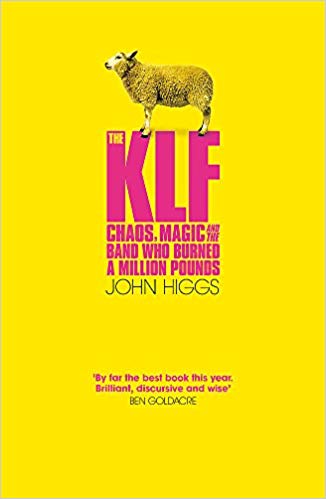The KLF
Chaos, Magic And The Band Who Burned A Million Pouds
John Higgs

An interesting summary of the history, and a thought provoking exercise in exploring the noosphere … no surprise to see Allan Moore cropping up.
This drift has been found to be so precise and predictable that it can be plotted on a graph, known as the Ebbinghaus curve of forgetting.
Indeed, the story of our evolution is essentially the story of us retreating from the natural world into the mental one.
The Doctor is the first British folk hero of the TV age, and the nature of his TV origins make him unusual. There is no definitive creator standing behind him, no Arthur Conan Doyle, J. R. R. Tolkien, Ian Fleming or J. K. Rowling. Instead, he popped out from the space between many minds. There was a succession of different actors, writers and producers who all invigorated the character for a short while before moving on or burning out. The character is defined by his ability to regenerate and change his personality. He can change all his friends and companions. He can go anywhere, at any time. He is, essentially, the perfect, never-ending story. He will survive long after you, me or anyone currently involved in making the series has died. He adapts, grows, mutates and endures. In this he fulfils much of the standard definitions for a living thing. This is not bad going, for a fiction.
New ideas came thick and fast from the likes of Einstein, Planck, Freud, Picasso and Joyce. Every breakthrough seemed to be pulling in the same direction, that of undermining certainty. Things were no longer anywhere near as simple as they had been. Our most fundamental bedrocks – time, space, matter, the rational mind – were discovered to be nothing like as dependable as they appeared. We were steaming ahead into uncharted territory.
The belief that endless growth is natural, inevitable and possible has become universally accepted. It has done so by building around itself one of Wilson’s self-referential reality tunnels to protect itself, a reality tunnel built out of laws, self-interest and economic experts. But there is a problem here, and it’s a significant one. Perpetual growth is in no way possible, regardless of what economists say.
Multiple-model agnosticism, then, is a way out of postmodernism which doesn’t lead to the belief that, out of all the billions of people in the world, you are the only one who really gets it and everyone else is an idio
Reality itself is ablaze with infinite connections: every particle in the cosmos affects every other particle. It’s Too Much, it really is, and seeing reality in all its innate finery would be so overpowering that you’d be in no state to nip down to the shops when you need a pint of milk.